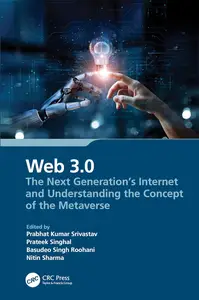
Free Download Web 3.0; The Next Generation’s Internet and Understanding the Concept of the Metaverse; 1
by Srivastav Prabhat Kumar
English | 2024 | ISBN: 1032609877 | 223 pages | True PDF | 11.19 MB
The book underscores AI’s transformative impact on reshaping physical, digital, and biological boundaries, converging with technologies like robotics, IoT, 3D printing, genetic engineering, and quantum computing-termed Web 3.0 Industrial Revolution. This global revolution integrates advanced production techniques beyond connected machines, extending into gene sequencing, nanotechnology, renewable energies, and quantum computing. The book’s main goals include providing a collaborative platform for academia and industry researchers to share contributions and shape the future through knowledge exchange. Recognizing recent progress driven by increased computing power, it highlights the positive impact of digital technology-AI, IoT, AR/VR, Additive Manufacturing, CPS, cloud computing, and robotics-on industrial efficiency and quality.Revolutionary AI Fusion: AI revolutionizes by blending physical, digital, and biological boundaries through cutting-edge technologies like robotics, IoT, 3D printing, genetic engineering, and quantum computing.Global Manufacturing Cooperation: AI creates a collaborative landscape where virtual and physical systems flexibly cooperate on a global scale.AI’s Diverse Impact: Beyond smart machines, AI drives breakthroughs in gene sequencing, nanotechnology, renewable energies, and quantum computing, distinguishing it from prior industrial revolutions.Progress and Digital Interface: Recent progress, powered by computing advancements, boosts industrial efficiency. The digital technology interface (AI, IoT, AR/VR, 3D Printing, CPS, CC, Robotics) significantly impacts industrial performance.
In conclusion, AI spearheads a transformative revolution, redefining the boundaries of the physical, digital, and biological realms. The fusion of AI with Web 3.0 Industrial Revolution, integrating advanced production techniques and global manufacturing cooperation, surpassing past industrial shifts. The book aims to be a collaborative platform for academia and industry researchers, fostering knowledge exchange to shape the future. In AI-driven manufacturing within Web 3.0, a paradigm shift envisions maximum output with minimal resource use. Coupled with ‘Digital Reality,’ it transforms business practices, consumer behaviour, and employment dynamics, redistributing wealth toward innovation and technology.










Leave a Reply
You must be logged in to post a comment.